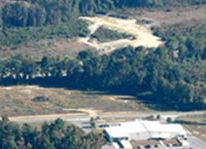Three significant developments today in alternative fuels:
—Range Fuels broke ground on one of the first cellulosic ethanol plants;
—Innovation Fuels took $15.5 million for a New Jersey biodiesel facility; and
—Codexis and Royal Dutch Shell decided to extend their research collaboration for another five years.
 We reported in March on a $76 million Federal government grant that Range won preliminary approval for. That grant was part of a $385 million package set aside for six companies.
We reported in March on a $76 million Federal government grant that Range won preliminary approval for. That grant was part of a $385 million package set aside for six companies.
The Fed has now confirmed that Range qualifies for the grant. The company is using the funding for construction of a plant in Soperton, Georgia. Of the full amount, $50 million will go toward the first phase of construction, and the remainder to the second phase.
If Range sticks to its plans, it could have the first commercial-scale cellulosic ethanol facility in the United States. Heretofore, only demonstration plants have been set up, some by larger companies who have avoided investing a great deal of money in cellulosic ethanol.
The hesitation by these companies is because making cellulosic ethanol is a more complicated process than making ethanol from plants like corn or sugarcane. The process requires breaking down the chemical structure of plants like trees and grasses.
Although there are several proven techniques for doing so, the associated costs and challenges in scaling such an operation aren’t well known, and there is uncertainty over which materials are best to use. Range plans on using locally available wood, while other companies have plans to work with faster-growing plants like switchgrass.
Innovation Fuels has made a somewhat safer bet with its plans to build a biodiesel facility in Newark, New Jersey. The news of its $15.5 million funding, the company’s first, was broken Monday by VentureWire (subscription required).
An unnamed bank and hedge fund contributed the funding for the plant, which VentureWire’s source said will have the capacity for about 40 million gallons annually. A separate plant the company is building in its hometown of Hampton, New York will reportedly have a 50 million gallon capacity.
Innovation doesn’t have a publicly available timeline for completing the facilities. The executive team has concentrated experience in trading and investment, which makes us wonder if the entire company isn’t a momentum play on the popularity of biodiesel, with the intention of ultimately selling the plants to larger companies. The company started life a year ago as a division of CEO John Fox’s company Homeland Energy Resources Development, which is essentially a consultancy for the cleantech projects of other companies.
Codexis is one of several companies exploring the use of biological processes to produce fuel; we recently wrote about a competitor called LS9.
The technology behind the process, which in Codexis’ case involves directly manipulating the DNA of microorganisms to produce different enzymes, can also be used for pharmaceuticals and other applications. In April, for instance, the company signed a large deal with Merck, a drug manufacturer.
The extension of Codexis’ research partnership with Shell also involves an investment by that company into Codexis, for an undisclosed amount. However, considering that the company’s last official funding was for $40 million and Shell is taking a seat on the board, we’d guess it was likely a substantial round.
Meanwhile, oil futures hit $97 per barrel today, while demand is expected to continue rising into next year. As rises in oil prices are usually accompanied by heightened interest in biofuel, we can expect plenty more news like this in the next few months.

